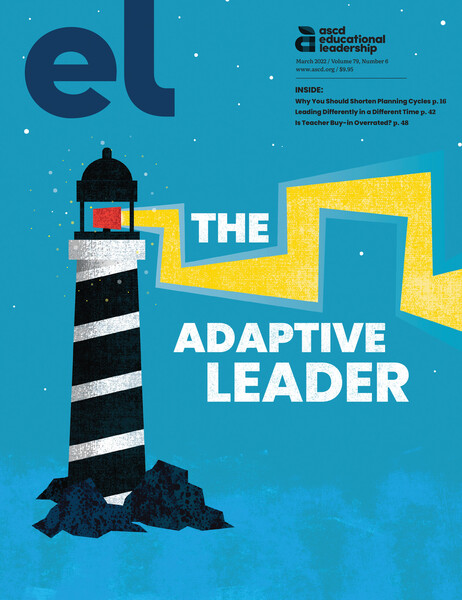In his column in this issue, Bryan Goodwin recalls hearing from some superintendents back in the spring of 2020 that it seemed to be the "star" principals who were struggling the most in leading their schools during the shift to remote learning. Why would this be? Goodwin speculates that these "formerly competent" leaders, though expert in managing day-to-day operational issues, were not well equipped to navigate conditions that were more fluid and uncertain. They struggled to think differently in the face of new circumstances.
This is not a knock on those principals. At this point, we all know that the pandemic has created one of the most challenging periods for schools in recent history. As Selma, Alabama, Superintendent Avis Williams, puts it: "For school leaders, the last two years changed everything."
This issue of Educational Leadership is an attempt to reckon with that change—and, perhaps more centrally, to help school and district leaders identify and build the skills and dispositions they need to guide schools in a time of profound transformation and uncertainty. The articles look back at lessons learned from the past two years, as well as to the evolving challenges ahead. They vary in specifics and focus, but they all address the basic question of who—or how—school leaders need to be now.
As the title of this issue suggests, one consensus answer to that question is: more "adaptive." Now more than ever, school leaders need to respond nimbly and effectively to complex new challenges. But what goes into that? What qualities and supports do leaders need to be more adaptive? As a prompt for reflection and discussion, here are some key ideas from the issue:
Flexible structures. Adaptive leadership is not just a matter of will. Leaders also need to put more flexible structures in place to allow for changes in course and more adaptive problem solving. In her article, Robyn Jackson encourages school leaders to shift from annual to 90-day improvement-planning cycles, to better reflect school realities. Likewise, Williams highlights her district's ability to relaunch its strategic plan in light of new priorities. Others recommend more flexible scheduling, hiring, and collaborative processes.
Collective purpose. At the same time, in navigating a complex challenge, adaptive leaders must be able to identify and clearly communicate a "collective purpose"—a shared and resonant schoolwide objective or "destination." This is not the same as mandating. It "involves finding something that meets teachers' felt needs [or] is consistent with the demands of the external environment," as Jal Mehta, Max Yurkofsky, and Kim Frumin write. In adaptive leadership theory, this means "getting on the balcony" to "gain a more objective perspective on the problem at hand."
Empowerment. Adaptive leadership is by definition distributed leadership. This notion runs throughout the issue. You can't address complex problems or major shifts without getting authentic input from others and tapping their creativity and collective knowledge and work. This may mean breaking down organizational hierarchies or divisions and creating more collaborative structures. According to Robert Feirsen, it also means developing stronger "psychological ownership," where staff members feel a sense of belonging, self-efficacy, and purpose in change initiatives.
Openness to new ideas and paradigms. This one may seem obvious, but it can be tough for leaders to absorb: When something isn't working, you need to move on or make adjustments. And you need to accept challenges to your ideas and what you've come to rely on as conventional wisdom or established practice. Adaptive leaders make a habit of expanding their comfort zones.
As Nate Levenson writes, "The leadership skill that will be most central to healing the educational harm of the pandemic is comfort in embracing new ways of doing old things."







